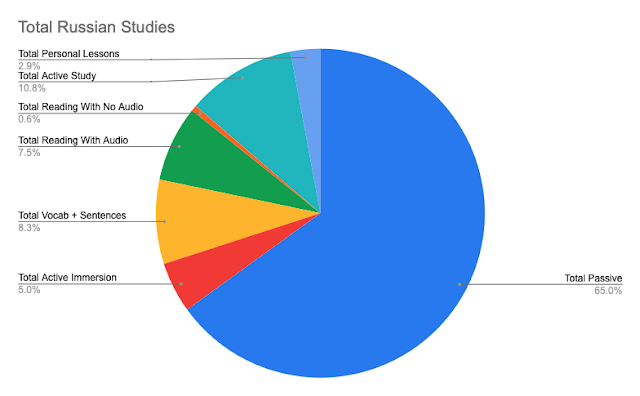Reassessing my efforts to acquire Russian
This week I've finished studying the Fluent Forever Pronunciation Trainer and I've also finished watching all the of the Zero Beginners Comprehensible Russian videos at least once (many several times).
Other than that my activities include passively listening to Dungeons & Dragons streams, memorising vocabulary using The Fluent Forever 625 important words and Xefjord's Basic Word and Phrases Deck as well as a little bit of reading of real dialogue subtitles on YouTube.
BTW, if you want to see a detailed breakdown of exactly what I've been spending my time on then have a look here: Google Doc: Russian Study Log
This week I found Matt vs Japan's new website Refold.la which has a roadmap detailing his method. In case you don't know Matt has attained a near native level of Japanese by basically combining mass immersion of input with vocabulary and phrase training (for recognition purposes) using Anki.
While it's not my aim to be mistaken for a native speaker I do like Matt's focus on efficiency in acquiring one language versus some people in the polyglot community who want to become conversational in as many languages as quickly as possible. If you are at all interested in the same then I highly recommend you read through Matt's roadmap.
With that in mind Matt is a big proponent of Stephen Krashen's idea to delay output (speaking) and focus on understanding the language first.
While the bulk of my 'studying' follows this method I've realised that in some of my activities I'm doing something else. For example when studying the 625 important words I'm not just recognising the words when I hear them, I'm also attempting to recall them when I see the pictures in the accompanying book. Now this is definitely an effective method because my ability to recognise and produce the words is strong, but progress is slower than I wold like.
Now I'm starting to wonder if even this very limited language production is contributing to my occasional tendency to translate between Russian and English in my mind.
In effect I'm spending 50% of my time with that list on output. And I have to remember that the goal right now is to increase my recognised vocabulary (the words I hear and know the meaning of) so that more input becomes comprehensible.
What this means is that when studying the 625 words I should only learn to recognise them by sound, even if I can read them and even it is possible for me to learn to produce them. With regards to Xefjord's 200 basic words and phrases I should delete the cards that ask me to produce Russian after being prompted with English.
Since I now have some extra time I might look into studying another word frequency list but ideally it's one that is just for recognising spoken Russian. I also want to do a little self-directed study to really learn to recognise 'connecting words' like 'also' and 'because' and question words like 'who', 'what', 'why' etc. because I often get them mixed up and I believe these will significantly aid my comprehension.
Finally, I'm going to continue listening and reading along with real dialogue, even if it's only for a few minutes a couple of times a week. I know this isn't explicitly recommend by the methods I'm following but it's something I really enjoy doing. As long as the subtitles are real transcriptions and not automatically generated it should do no harm and it can only be a good thing that I enjoy hearing Russian speak.

Comments
Post a Comment